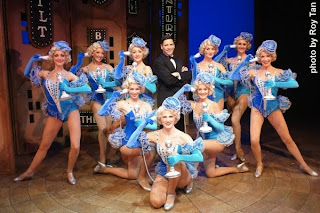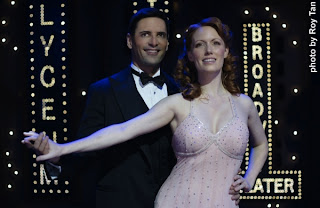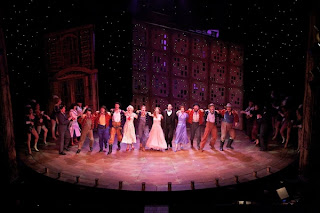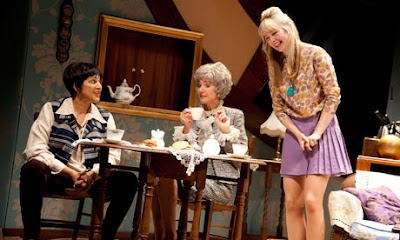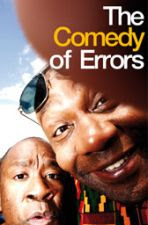 Luckily the National Theatre has highlighted the word COMEDY on the programme cover for their new production of THE COMEDY OF ERRORS. You would be hard-pressed to know it was one from Dominic Cooke's production.
Luckily the National Theatre has highlighted the word COMEDY on the programme cover for their new production of THE COMEDY OF ERRORS. You would be hard-pressed to know it was one from Dominic Cooke's production.Oh Mr. Cooke... your production of CLYBOURNE PARK was one of the best of last year - by turns hilarious and thought-provoking. Here all one can marvel at is why such a such a dreary 'concept' has been clamped down over this play.
I can't say I am the biggest fan of Shakespeare's comedy of mistaken identity as it plays into my infamous irritation at farce but here any potential for interest is stymied by an ugly production in which the action is needlessly transported to current day South London.
 I knew I was in for trouble within a few minutes during the opening scene of the merchant from Syracuse explaining to the Duke of Ephesus why he is in the country when it is forbidden. It is played as a gangland kidnapping with ex-work colleague Ian Burfield playing the Duke like a long-lost brother of The Krays. It was totally disorientating as well as being poorly acted. I felt for veteran actor Joseph Mydell as his speech about the shipwreck that cost him his wife. one of his twin sons and their allotted servant being totally upstaged by a needless reenactment of it including an on-stage airlift.
I knew I was in for trouble within a few minutes during the opening scene of the merchant from Syracuse explaining to the Duke of Ephesus why he is in the country when it is forbidden. It is played as a gangland kidnapping with ex-work colleague Ian Burfield playing the Duke like a long-lost brother of The Krays. It was totally disorientating as well as being poorly acted. I felt for veteran actor Joseph Mydell as his speech about the shipwreck that cost him his wife. one of his twin sons and their allotted servant being totally upstaged by a needless reenactment of it including an on-stage airlift.After that I sat watching the action with a diminishing interest which was only fully engaged oddly enough when Bunny Christie's overly-elaborate set refused to work! Lenny Henry is cast as the Antipholus and gives a nice enough performance but why does he have to use an unnecessary African accent? He could just as well as used his natural Brummie accent to highlight the fact that he is a visitor to Ephesus/Peckham? Even regular favorites like Claudie Blakely and Michelle Terry failed to impress.
It goes without saying that the verse speaking is beyond bad and it was lucky that I had a knowledge of the play beforehand - truly the nadir of the evening was a farting competition via intercom between the Dromios.
I saw Ian Charleson's Hamlet on that stage.
 Just as the final scene started - and I was grasping under the seat for my bag to high-tail it out of there - something extraordinary happened. Cooke just let Pamela Nomvete as the long-lost Aemilia perform her speech without any distracting business going on and she stole the show in those few minutes. How odd to sit through a show for about 2 hours and only become fully engaged in the last scene.
Just as the final scene started - and I was grasping under the seat for my bag to high-tail it out of there - something extraordinary happened. Cooke just let Pamela Nomvete as the long-lost Aemilia perform her speech without any distracting business going on and she stole the show in those few minutes. How odd to sit through a show for about 2 hours and only become fully engaged in the last scene.I left the Olivier thinking that if the National had wanted to stage THE COMEDY OF ERRORS but in a radical new way all they had to do was stage the Rodgers & Hart musical version THE BOYS FROM SYRACUSE, at least then we would have had a good laugh *and* also have got FALLING IN LOVE WITH LOVE, THIS CAN'T BE LOVE and SING FOR YOUR SUPPER.








































